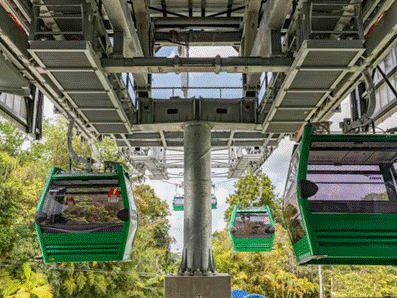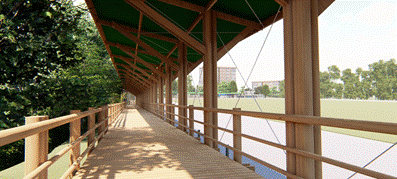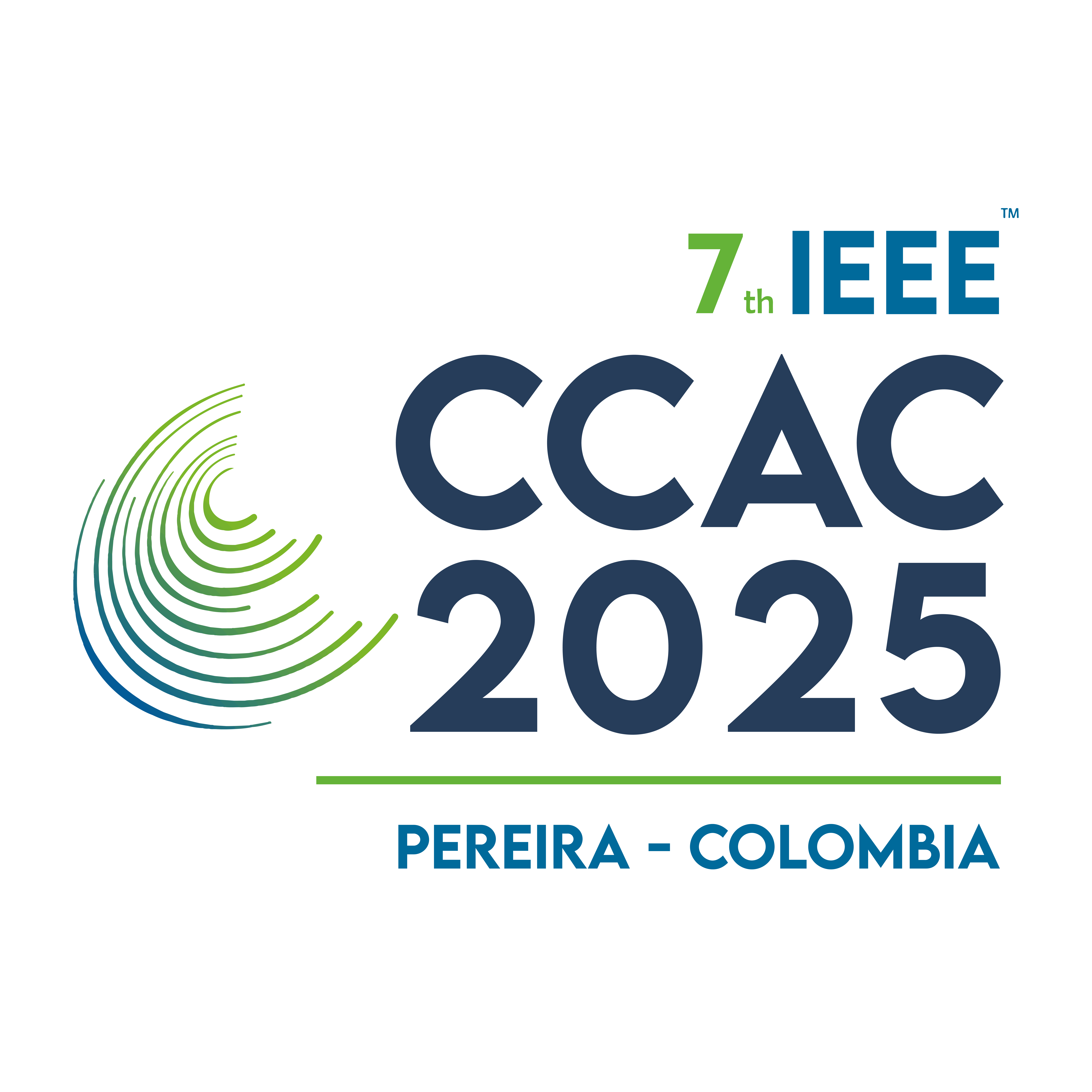📍 Place:
Universidad Tecnológica de Pereira, Risaralda, Colombia
Lecture Hall – Building 13 (Salas magistrales bloque 13)
🗓 Schedule – October 14
| Time | Room I | Room II |
|---|---|---|
| 8:00 – 9:45 a.m. | 👉 Registration 🎤 Welcome session 🤖 Workshop 1: Robotics, Embedded Autonomy and Communication Theory Speaker: Stephany Gill | |
| 10:00 a.m. – 12:00 m. | 🧩 Workshop 2: Novel tools for Hybrid Control: From Fixed-Time Stabilization to Model-Free Optimization via Lie-bracket Averaging Speaker: Jorge Poveda | |
| 2:00 – 4:45 p.m. | 🤖 Workshop 4: Distribution Systems Planning using Generative AI Speaker: Pedro Vergara | 🛠 Workshop 5: 3D Modeling and Digital Twins for Hardware Development Speakers: Eduardo Giraldo, Sergio Velarde |
| 4:15 – 6:00 p.m. | 🔗 Workshop 6: An Introduction to Distributed Optimization: Algorithms and Applications Speakers: Germán Obando, Andrés Pantoja | 🔍 Workshop 7 Speaker: Fabian Salazar Cáceres |
| 6:00 – 7:30 p.m. | 🍸 Welcome Cocktail (Laboratorio Gastronómico UTP) |
🚏 Venue Information
The workshops will take place on October 14 in the lecture halls of Building 13, Universidad Tecnológica de Pereira.
The university is just a 5-minute drive from the main event venue.
- 🚡 Accessible by cable-car (Megacable).
- 🚶♂️ Walkable (note: includes uphill sections).
- 🚕 Taxi ride from Movich hotel: ~ $7,000 COP (≈ 1.7 USD).
🛣 Entrances to the University
- 🚪 Entrance #3 → Closest to Building 13.
- 🏛 Main entrance → Walk along the inner path, cross the “guaducto” to reach Building 13.
- 🚡 Megacable → After arriving, cross the soccer field, then the inner path, and finally the “guaducto” to reach Building 13.
🗺 Landmarks
- 🏢 Building 13 → Venue of the workshops.
- 🌉 Guaducto → Pedestrian bridge connecting the main path.
- 🌿 Inner path → Leads to the lecture hall area.
- ⚽ Football field → Wooden path surrounds it for access.

🏢 Entrance #3: This is the closest one to building 13

Main entrance: if you arrive here, then walk in the inner path and cross the “guaducto” to arrive to Building 13.

🏢Building 13: Venue of the workshops, October 14.

🌉 Guaducto: Pedestrian bridge connecting the main path.

Megacable: if you arrive by the cable-car cross the soccer field, then, the inner-path and finally the “guaducto” to arrive to Building 13.

⚽Football field. There is a wooden path that surrounds the soccer field.
🤖 Workshop 1: Robotics, Embedded Autonomy and Communication Theory
👤 Speaker: Stephanie Gil
Harvard University
👨🏫 Biography
Stephanie Gil received the B.S. degree from Cornell University, Ithaca, NY, USA, in 2006, and the M.S. and Ph.D. degrees from the Massachusetts Institute of Technology (MIT), Cambridge, MA, USA, in 2009 and 2014, respectively.
Prior to joining Harvard, she was:
- Visiting Assistant Professor at Stanford University (Summer 2019).
- Assistant Professor at Arizona State University (2018–2020).
She is currently an Assistant Professor of Computer Science with the School of Engineering and Applied Sciences, Harvard University, Cambridge, MA, where she directs the Robotics, Embedded Autonomy and Communication Theory Lab.
🔬 She holds U.S. patents in:
- Adaptive heterogeneous networks for multirobot systems.
- Accurate indoor positioning using wireless signals.
Her research focuses on multirobot systems, studying the impact of information exchange and communication on resilience and trusted coordination.
🏅 Awards and Recognitions:
- National Science Foundation (NSF) CAREER Award (2019).
- Office of Naval Research (ONR) Young Investigator Award (2021).
- Sloan Research Fellowship (2020) for her pioneering work at the intersection of robotics and communication.
🧩 Workshop 2: Novel tools for Hybrid Control
From Fixed-Time Stabilization to Model-Free Optimization via Lie-bracket Averaging
👤 Jorge I. Poveda
University of California, San Diego
📄 Abstract
This workshop will discuss recent results on the design and analysis of hybrid feedback laws for achieving fixed-time and prescribed-time stability properties, as well as the synthesis and analysis of model-free hybrid controllers for optimization problems with complex geometric constraints.
We study general classes of hybrid dynamical systems, including constrained and time-varying nonlinear systems, and show how Lyapunov-based tools and perturbation-based theory can be used to achieve arbitrarily fast convergence bounds in complex stabilization and optimization problems. Several connections with robust control and homogeneity theory will be presented. The workshop will be delivered as a sequence of academic talks, with breaks for discussions and questions from the audience.
📚 Detailed Program
The workshop will cover the following topics, presented using a unifying mathematical framework:
- 🔹 Introduction to Hybrid Inclusions: Mathematical models and examples.
- 🔹 Fixed-Time Stabilization in ODEs: Examples in non-Lipschitz systems.
- 🔹 Fixed-Time Stabilization in Hybrid Systems: Switching Systems and Reset Control.
- 🔹 Applications to Feedback Optimization.
- 🔹 Prescribed-Time Stabilization in ODEs: Mathematical models and examples.
- 🔹 Prescribed-Time Stabilization in Hybrid Systems: Novel average dwell-time conditions and applications for decision making in games.
- 🔹 Lie-bracket Averaging for Hybrid Systems:
a. Mathematical models and examples
b. Applications to Model-Free Optimization
c. Applications to Model-Free Control - 🔹 Conclusions and Future Research Directions.
🎯 Prerequisites
The target audience of the workshop are graduate students and faculty interested in learning recent advances in the areas of hybrid and nonlinear control, with applications in engineering and decision-making systems. The workshop will be self-contained: it will present all the fundamentals and mathematical tools needed to navigate the results in a tutorial manner.
👨🏫 Biography
Dr. Poveda is an Assistant Professor in the Electrical and Computer Engineering department at the University of California, San Diego, USA, where he also holds an affiliate appointment in the Mechanical and Aerospace Engineering Department. He obtained his B.S. degrees in Electronics and Mechanical Engineering from the University of Los Andes, Colombia, in 2012, and his M.S. and Ph.D. degrees in Electrical and Computer Engineering from the University of California, Santa Barbara, in 2016 and 2018, respectively. He also worked as a Research Intern at the Mitsubishi Electric Research Laboratories in 2016 and 2017. Subsequently, he was Postdoctoral Fellow at Harvard University (2018) and an Assistant Professor at the University of Colorado, Boulder (2019-2022).
🔗 Workshop 3: An Introduction to Distributed Optimization
Algorithms and Applications
👤 Germán Obando and Andrés Pantoja
Department of Electronics, Universidad de Nariño
📄 Abstract
This workshop introduces distributed optimization (DO) and its applications in networked control systems. We will begin with the fundamental concepts of network systems and graph theory to analyze basic distributed optimization algorithms.
The session will cover the consensus algorithm as a core tool for decentralized coordination and explore a population dynamics-based approach to solve distributed control problems. The presentation includes practical examples in MATLAB with a basic editable code to illustrate the concepts and provide a starting point for attendees’ own research.
🎯 Prerequisites
- A basic understanding of linear algebra.
- Familiarity with Matlab or a similar numerical computing environment is highly recommended.
📚 Detailed Program
- 🌐 Foundations of Network Systems: Motivation for Distributed Systems. Concepts of Graph Theory.
- ⚙️ Distributed Optimization in Practice: Core principles of distributed optimization algorithms. Case Study: Applying DO to a curve fitting problem.
- 🤝 Consensus and Coordination: The consensus algorithm as a tool for achieving agreement in networks. Case Study: The robot rendezvous problem.
- 🧬 From Populations to Control: Introduction to population dynamics for decentralized control. Discussion of potential control applications and extensions.
👨🏫 Biography
German Obando: Electronic Engineer from the University of Nariño, Pasto, Colombia, Master’s and PhD degrees from the University of los Andes, Bogotá, Colombia and the Ecole des Mines de Nantes, France, in 2016. He joined the Faculty of Engineering, Science and Technology of the University of Rosario, Bogotá, in 2017, where he assumed the role of Assistant Professor and Head of the Department of Electronic Engineering. In 2020, he was named Distinguished Lecturer at the University of Rosario and recognized as an Illustrious Alumnus of the Faculty of Engineering of the University of Nariño. His current research interests include population dynamics, distributed control, and time-delayed systems.
Andrés Pantoja: Received his degree in Electronics Engineering from the National University, Manizales, Colombia, in 1999, and his Master’s and PhD degrees in Electronic Engineering from the University of los Andes, Bogotá, Colombia, in 2008 and 2012, respectively. In 2003, he joined the Department of Electronics at the University of Nariño, Pasto, Colombia, where he is currently an Associate Professor and Head of the Electronics Department. His research interests include dynamic resource allocation, distributed generation, distributed control in smart grids and buildings, and coordination in large-scale systems.
⚡ Workshop 4: Distribution Systems Planning using Generative AI
👤 Speaker: Pedro P. Vergara
Associate Professor, Delft University of Technology, Netherlands
📄 Abstract
The increasing levels of digitalization in our modern society will enable the required paradigm change for electrical distribution networks. More customer data is available (e.g., via smart meters), which can be used to characterize their energy consumption behavior.
Simultaneously, distribution system operators (DSOs) are ramping up investments in digitalizing their infrastructure (e.g., by placing more advanced measurement units in MV and LV transformers). This process is resulting in a significant increase in available operational data.
From the DSOs’ perspective, all this operational data represents an excellent opportunity to learn how to make better planning decisions. The challenge is extracting complex and hidden dynamics from enormous databases and learning to solve (or even anticipate) technical problems faster or more efficiently.
In this talk, we will discuss the role of Generative AI and machine learning in such a digitalized future scenario.
📚 Detailed Program
This workshop will cover the following topics:
- 🤖 Generative AI
- 🗃 Synthetic data generation – What is it and how can we use it?
- ⚡ Distribution systems planning
- 🔋 Active Hosting Capacity – Beyond a passive concept
🎯 Prerequisites
Basic concepts of machine learning (ML) and distribution systems planning and operation.
👨🏫 Biography
Pedro P. Vergara is an Associate Professor at the Intelligent Electrical Power Grids (IEPG) group at the Delft University of Technology in the Netherlands. He is also a Senior Member of the IEEE Power and Energy Society.
- 🧪 From 2019 to 2020, he was with the Eindhoven University of Technology (Netherlands) as a postdoctoral researcher, working on Dutch-funded projects with industry and academic partners.
- 🎓 He holds a Ph.D. from the University of Campinas (Brazil) and from the University of Southern Denmark (Denmark).
Dr. Vergara’s research focuses on:
- Developing new mathematical programming models and data-driven control approaches for operating distribution systems with high penetration of low-carbon energy resources (PVs, EVs, electric heat pumps, etc.).
- Leading developments in the H2020 MAGPIE and Drive2X projects, NWO DATALESS project, and NWO ALIG4Energy project, involving Dutch and European partners.
📑 He has authored 30+ scientific publications in leading international conferences and journals.
✍️ He also serves as Guest Editor in special issues on active distribution networks for the IEEE MPCE Journal and IEEE Transactions on JPV Journal.
🛠 Workshop 5: 3D Modeling and Digital Twins for Hardware Development
👤 Eduardo Giraldo Suárez – Sergio Velarde Gómez
Universidad Tecnológica de Pereira
📄 Abstract
This workshop will address the importance of 3D modeling as a fundamental tool in hardware design and construction using emerging manufacturing technologies such as 3D printing, as well as its role in the implementation of digital twins within advanced simulation environments such as MATLAB/Simulink, ROS, Unity, and NVIDIA Isaac Sim.
The workshop will present how the creation of three-dimensional models not only optimizes the design and physical prototyping process, but also enables the generation of virtual representations that facilitate the analysis, validation, and deployment of control and perception algorithms in cyber-physical systems. In addition, we will explore the impact of digital twins on cost reduction, reliability improvement, the acceleration of innovation cycles in applied engineering, and the democratization of knowledge through open-source tools.
📚 Detailed Program
- 🖊 Introduction to 3D modeling: fundamentals and computer-aided design (CAD) tools.
- 🖨 3D printing from 3D modeling.
- ⚡ From CAD to simulation: model integration in MATLAB/Simulink.
- 🤖 Digital twins in robotics: connecting 3D models with ROS.
- 🎮 Advanced simulation with NVIDIA Isaac Sim: perception, control, and validation in virtual environments.
- 📊 Case studies: from hardware prototypes to control algorithm testing.
- 🚀 Benefits of the digital approach: reduced development time, early validation, and scalability.
- 🔮 Future perspectives: integration with artificial intelligence and augmented/virtual reality environments.
🎯 Prerequisites
The workshop is aimed at graduate students, researchers, and professionals interested in the design of mechatronic systems, robotics, and intelligent hardware development. No prior experience with the mentioned platforms is required, as the workshop will provide the introductory fundamentals needed to understand the concepts within an applied framework.
👨🏫 Biography
Eduardo Giraldo: Received his bachelor and master degrees in Electrical Engineering from Universidad Tecnológica de Pereira, and his PhD degree from the Universidad Nacional de Colombia (2014). He is currently a professor at the Department of Electrical Engineering, UTP Pereira in Colombia, and the head of the Research Group in Automatic Control. His research interests include system identification, adaptive control, optimal control, state estimation, dynamic inverse problems, digital twins, hardware design and its applications over several physical systems, from biological systems to power systems.
Sergio Velarde: Received his BSc and MSc degrees in Electrical Engineering from Universidad Tecnológica de Pereira, where he is currently a lecturer in the Electrical Engineering program. He is pursuing his PhD at UTP within the GCA research group. His research interests include the optimal design of permanent magnet synchronous machines, 3D printing, and autonomous electric mobility, with additional interests in robotics, precision agriculture, and virtual environment simulation.
